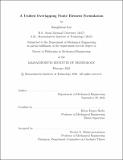A Unified Overlapping Finite Element Formulation
Author(s)
Lee, Sungkwon
DownloadThesis PDF (31.05Mb)
Advisor
Bathe, Klaus-Jürgen
Terms of use
Metadata
Show full item recordAbstract
The use of finite element analysis has now become ubiquitous in engineering practice. However, obtaining an adequate mesh for a geometrically complex analysis domain is still challenging in traditional finite element analysis since the elements can be severely geometrically distorted and thus perform poorly.
The AMORE meshing scheme and the overlapping finite elements have been recently proposed to easily obtain an effective mesh for a geometrically complex domain. The AMORE scheme, which stands for automatic meshing with overlapping and regular elements, fills the analysis domain mostly utilizing undistorted finite elements and discretizes the regions not filled by these elements using overlapping finite elements which are quite distortion insensitive.
This thesis proposes a new unified overlapping element formulation that easily applies to any of the basic elements including the three-dimensional elements. The new formulation is based on the earlier formulation but no longer requires the calculations of the Shepard functions used in meshless schemes. The new one-, two- and three-dimensional overlapping elements contain no spurious zero energy mode, pass the patch test, and also show good distortion insensitivity.
Given that the previous studies on overlapping elements focused on solving two-dimensional linear elastic problems, we demonstrate the use of the new elements and AMORE not only in two-dimensional but also in three-dimensional linear structural analyses. Particularly, the thesis includes the first study on the modal and mode superposition solutions using overlapping finite elements. Illustrative example solutions show that the new discretizations are very promising in reducing the meshing effort in linear structural analyses.
Date issued
2023-02Department
Massachusetts Institute of Technology. Department of Mechanical EngineeringPublisher
Massachusetts Institute of Technology